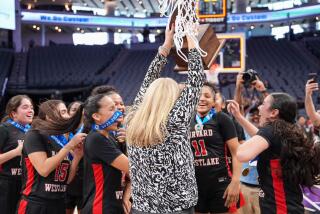2 Private Schools Allowed to Merge : Education: A judge refuses to block an all-girls school from combining operations with an all-boys institution.
- Share via
A Los Angeles Superior Court judge Friday refused to grant an injunction blocking the merger of two of Los Angeles’ most prestigious private schools, Harvard School and Westlake School for Girls.
The decision by Los Angeles Superior Court Judge Miriam A. Vogel was a major setback for a group of Westlake parents and alumnae who had filed suit in an effort to preserve the independence and single-sex tradition of the school, whose graduates include actress Candice Bergen and astronaut Sally Ride.
Attorneys said the denial of the injunction meant that the two schools, whose trustee boards have already approved the merger, would proceed with plans to combine operations starting in September, 1991. Opponents of the merger have the option of continuing to press their suit, but on Friday they were undecided on their course of action.
The merged coed school would be called the Harvard-Westlake School and would operate two campuses--lower grades at the Westlake site in Holmby Hills and high school grades at Harvard’s Studio City property.
Opponents of the merger contended that Westlake’s trustees acted on insufficient information and violated the school’s charitable trust by voting to end its independence and commitment to all-girls education. They said Harvard’s ties to the Episcopal Church made it incompatible with Westlake, which is non-sectarian.
And they also argued that the merger was engineered by a group of wealthy, socially prominent people with ties to both schools, led by Peter and Helen Bing of West Los Angeles. Helen Bing is a trustee and benefactor of Westlake, and Peter Bing, a physician, serves on the board of Harvard.
In denying the injunction, Vogel said the Westlake trustees were acting within the law when they voted 16 to 5 last month to merge with Harvard. “The bottom line is that 16 members of the board felt they had enough information to make a prudent business decision and they did so,” she said.
Despite Westlake’s 85-year single-sex tradition, Vogel said there was nothing in its articles of incorporation preventing it from becoming coed.
Vogel also said there was nothing to indicate that the Episcopal Church would dominate the merged school. “The kind of diverse student body (at Harvard) is not the result of a board dominated by the Episcopal Church or anyone else,” she said.
Vogel also rejected the contention that Peter and Helen Bing’s board memberships presented a conflict of interest. “If this involved Ford or General Motors and the issue involved profits, then that would be different, but everybody donates their time,” she said. “I don’t see it (the potential conflict).”
Harvard’s 1989-90 enrollment is about 800 students in grades seven to 12, while Westlake’s enrollment is about 700 for the same grades. Tuition at both schools runs about $8,000 a year.
Opponents of the merger were given a ray of hope Friday when the state attorney general’s office, named as a defendant in the case, questioned whether Harvard could merge with an all-girls school because of a clause in its articles of incorporation restricting it to the education of “boys and young men.”
“What that means is that it is not a done deal yet,” said Karen Kaplowitz, attorney for the opponents of the merger. “We are disappointed by the decision but we haven’t given up.”
Attorney Richard Clark, who represented the Westlake trustees, said he was confident that Harvard will be able to work out the new obstacle with the attorney general.
More to Read
Sign up for Essential California
The most important California stories and recommendations in your inbox every morning.
You may occasionally receive promotional content from the Los Angeles Times.













